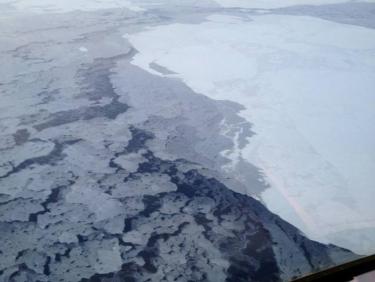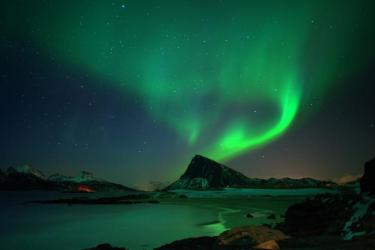CU Boulder launching Arctic studies program this spring
Students will study environment, politics and culture of polar region in 18-credit certificate program
By Sarah Kuta
Originally published on 12/26/2016 with the Daily Camera
Starting in January, students at the University of Colorado will be able to earn a cool new certificate — literally.
The university is launching an 18-credit Arctic studies certificate program for undergraduates on the Boulder campus this spring semester.
Courses required to earn the certificate, which is open to students of all majors, will discuss the environmental, political and cultural issues of the polar region, which includes parts of Canada, Greenland, Finland, Iceland, Norway, Sweden, Russia and the United States.
 |
| The Arctic sea ice is pictured in 2013. (National Oceanic and Atmospheric Administration) |
"If you look at the Arctic, it's the key place in this world where climate change and geopolitics are becoming very, very closely intertwined with each other," said Mark Serreze, director of CU's National Snow and Ice Data Center. "In no other place in the world do you really see this emerging as strongly as you see it in the Arctic. One of the big things driving this whole certificate is the recognition that the Arctic is becoming a very important region and we ought to be paying attention to it."
Serreze is developing a new course for the certificate program titled "Introduction to Arctic Climate and Environment," which will be offered for the first time in the spring semester. His current research focuses on the effects — environmental and otherwise — of disappearing sea ice in the Arctic region.
"The Arctic is in the midst of a pretty radical transformation right now," he said. "It's losing its sea ice cover. It's warming quickly. Permafrost is thawing. As the Arctic loses its ice, especially its sea ice, it becomes more accessible."
The loss of sea ice has created a growing Arctic tourism industry and has made the region more appealing for oil and natural gas extraction.
It has also made the region more accessible to trans-Arctic shipping, Serreze said.
In addition to learning about the effects of climate change, students will also study conflicts over resources and land, governance issues faced by native and indigenous populations and the cultural history of the Arctic, according to Ben Teitelbaum, a CU assistant professor and the director of the new program.
The certificate came together quickly in the last year because CU already has an array of on-campus units that study issues related to this region, including the National Snow and Ice Data Center, the Institute of Arctic and Alpine Research and the Cooperative Institute for Research and Environmental Science, Teitelbaum said.
 |
| Aurora lights in Norway |
He added that CU also has strong programs in Nordic studies, Russian studies, geography, environmental studies, anthropology and international affairs.
Eventually, Teitelbaum said he would like to design a study abroad program that would send students to northern Canada.
"CU has a research program in Canada studying indigenous peoples and their historical methods of talking about and measuring sea ice, which is exactly the fusion of social science and anthropology and natural sciences that we want to get at with this degree," he said.
Teitelbaum and Serreze agreed that the certificate program would be a useful addition to any undergraduate degree at CU. It may be particularly useful for students who are interested in careers in the arts, international politics, diplomacy, indigenous rights, environmental science and climate change.
"The Arctic is going to become a real hotbed of activity here in the coming years," Serreze said.
"There's just so much happening up there that can influence things across the world and so I think having students prepared for some career dealing with these emerging Arctic issues puts them in a good position because we are going to be needing people with this sort of knowledge."
Sarah Kuta: 303-473-1106, kutas@dailycamera.com or twitter.com/sarahkuta
